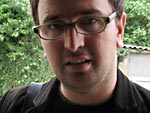 |
|
Jeton Nezirai, our site administrator in Prishtina.
|
 |
|
|
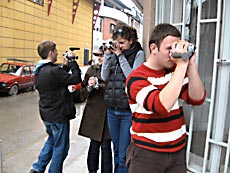 |
|
Skip's street camera exercises in Prishtina
|
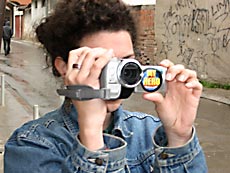 |
|
Shota, one of the local filmmakers who attended the workshops.
|
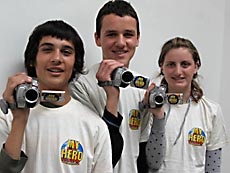 |
|
MY HERO High School reporters who called themselves the evilmakers.
|
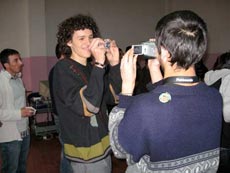 |
|
The evilmakers, circa 2008.
|
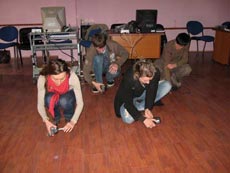 |
|
Skip's camera exercises: the crowtch position.
|
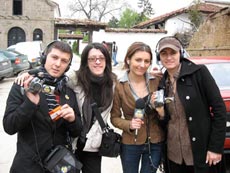 |
A MY HERO Global Exchange crew filming their project, Identiteti. |
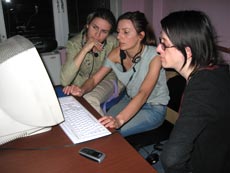 |
|
|
|
KOSOVO
Site Administrator: Jeton Neziraj
Multimedia Center for Visual Arts
Dodona Theater
Prishtina, Kosovo
Text and movie by Antonio Mendoza
The Multimedia Center for Visual Arts, where we held the MY HERO / GLOBAL EXCHANGE workshops, is a production space rented in the Dodona Theater in Prishtina. Jeton Neziraj, our Kosovan Site Administrator, is a famous local playwright. At the time of our workshops, one of his plays was being performed at the National Theater. When we returned to for the second set of workshops, Jeton had just been named Artistic Director of the National Theater.
The Multimedia Center is a vibrant and active organization, which made it a great place for My Hero to have a Kosovar presence. The Dodona is a lively theater with lots of people and activities.
Kosovans were very grateful that MY HERO came to their hometown to mentor them in video production and storytelling. Hopefully next year MY HERO will return to Prishtina and bring more tools to the Multimedia Center to help local students, artists and activists tell their stories of hope and redemption.
2007 Workshops
In Prishtina the war is at the forefront of everyone's mind. So when we proposed making movies about heroes and people they admired, it was not surprising that they all made movies about Kosovo, the war and its aftermath. The participants in our workshops in the Dodona Theater were mostly ethnic Albanians except for one young man of Egyptian descent and and his ex-pat American wife. The people who attended the workshops were students, artists, writers, human rights activists and actors.
Like in Macedonia, the workshops started with a presentation of the MY HERO Project and how to make values-based hero stories. Then we learned how to use the camcorder and did camera exercises. Once the participants recorded the media they wanted, they started learning Photoshop and Final Cut Pro so they would be able to edit their own movies.
At the end of our five days in Kosovo, the participants of the workshops produced six movies that mostly involved street interviews. Surprisingly everyone in Kosovo was very open and willing to talk to strangers with cameras. Three high school students who were interviewed in the street during Skip's camera exercises, were so enthusiastic about our project that they later joined our group and made a movie.
2008 Workshops
On our return trip to Kosovo, we were excited that on February 17, 2008, they had gained their long-sought independence. We found Prishtina, with its newfound freedom, full of energy and creativity. There seemed to be a sense of Kosovo being a newborn country brimming with possibilities.
Jeton Neziraj and Arben Zharku put together a strong team of participants, who were both talented and committed, including high school and college students, a few theater professionals, and the mysterious, Fatmir Puka, a former TV cameraman, who seemed content hanging around and taking pictures.
Three 10 to 12-year-olds came for a couple of days to edit The Book, a narrative short they had previously shot with the My Hero camera we left at the Multimedia Center in 2007.
On the first day of workshops we talked about hero-themed projects, watched Rowena Gerber and Cookie Girl, and did camera exercises. We separated the participants into five groups of three and the students went out and shot street interviews. On the second day we started Final Cut Pro, capturing the street interviews, when we had a blackout. Some teams lost what they captured, others remembered to "Command-S" and saved their work.
At the end of the day we screened the interviews. For the next three days, we recorded, captured, edited, then rerecorded, recaptured and reedited their final projects. Participants floated in and out, and so did Jeton and Arben. Through the seeming chaos (and two blackouts), surprisingly, 10 videos were completed - with six subtitled and translated - in five days: three interview tapes, four documentary shorts, one fiction short, and two art videos.
The high school students - among them Yllçë Paçarizi, Durim Kryeziu and Durim Neziri - were hard working and dedicated to their projects.
Yllçë, an impressive young lady, eagerly took on the story from a clipping of the LA Times about Prishtina's first center against domestic violence and turned it into the hero portrait, Women for Women. Her team, comprised of Ben Apolloni, and Malsor Ajeti, made and subtitled two videos during the five days of workshops, a great achievement in and of itself.
Teenagers Durim Kryeziu and Durim Neziri completed an amusing interview video and a video portrait of an easy-going, local artist entitled, The Artistic Life.
College students Jeton Qerimi, Asdren Nivokazi and Mentor Musa made two videos, an interview video and A Bohem, a portrait of Faruk Begolli, a legendary actor, adored college professor, and the founder of the Dodona Theater.
Theater professionals Shkurta Aliu, Fatime Kosumi and Dafina Rudi made Identiteti, a beautiful and accomplished piece about a celebration of tradition at the Ethnology Museum of Prishtina. The piece featured Burbuqe Deva-Bakia, the Kosovar Minister of Culture. Our presence at the event was suggested by Aferdita Krasniqi, Cultural Exchanges Assistant, U.S. Dept of State.
The final screening was held in the Dodona Theater and well-attended by friends, family and members of the local artistic community, including Azem Buzuku, the traditional storyteller featured in Identiteti.
Download the text of THE BRIDGE (pdf - 168 KB), the play by Jeton Neziraj. In October 2008, Jeton's play, The Bridge, has been turned into this excellent animated short film.
|